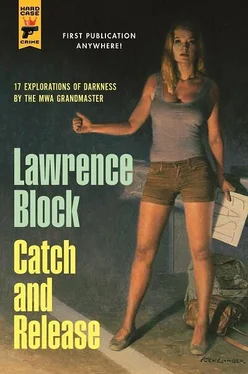Maybe Bellerman would realize that the last thing he wanted to do was waste a morning playing with Kramer.
And yet, when he was back at the range that Friday, he felt vaguely sorry (if more than slightly relieved) that he hadn’t heard from the man. He knew how much he’d improved in recent months, hitting every club reasonably well (including, this particular day, the notorious 1-iron) and of course it would be different on a golf course, but how different could it be? You had the same clubs to swing, and you tried to make the ball go where you wanted it.
And just suppose he turned out to be good at it. Suppose he was good enough to give Bellerman a game. Suppose, by God, he could beat the man?
Sort of a shame he wasn’t going to get the chance...
“Good shot,” said a familiar voice. “Hit a few like that tomorrow and you’ll do just fine. Don’t forget, I’m coming for you at six. So remember to take your clubs home when you’re done here today. And make sure you’ve got enough golf balls. Kramer? I’ll bet you don’t have any golf balls, do you? Ha! Well, buy a dozen. They’re accommodating at my club, but they won’t hand you a bucketful.”
On the way there, Bellerman told him he’d read about Japanese golfers who spent all their time on driving ranges and putting greens. “Practicing for a day that never comes,” he said. “It’s the cost of land there. It’s scarce, so there aren’t many golf courses, and club dues and greens fees are prohibitive unless you’re in top management. Actually, the driving range golfers do get to play when they’re on vacation. They’ll go to an all-inclusive resort in Hawaii or the Caribbean and manage to squeeze in thirty-six holes a day for a solid week, then go home and spend the rest of the year in a cage, hitting balls off a tee. Well, today’s your vacation, Kramer, and you don’t have to cross an ocean. All you have to do is tee up and hit the ball.”
It was a nightmare.
And it began on the very first tee. Bellerman teed off first, hitting a shot that wouldn’t get him in trouble, maybe a hundred fifty yards down the fairway with a little fade at the end that took some of the distance off it.
Then it was Kramer’s turn, and he placed a brand-new Titlist on a brand-new yellow tee and drew his Big Bertha from his bag. He settled himself, rocking to get his cleated feet properly planted, and addressed the ball, telling himself not to kill it, just to meet it solidly. But he must have been too eager to see where the ball went, because he looked up prematurely, topping the ball. That happened occasionally at Chelsea Piers, and the result was generally a grounder. This time, however, he really topped the thing, and it caromed up into the air like a Baltimore chop in baseball, coming to earth perhaps a hundred feet away, right where a shortstop would have had an effortless time gathering it in.
Bellerman didn’t laugh. And that was worse, somehow, than if he had.
By the third hole, he was just waiting for it to be over. He’d taken an eight on the first hole and a nine on the second, and at this rate he seemed likely to wind up with a score somewhere north of 150 for the eighteen holes Bellerman intended for them to play. That meant, he calculated, around 130 strokes to go, 130 more swings of one club or another. He could just go through it, a stroke at a time, and then it would be over, and he would never have to go through anything like this again.
“Good shot!” Bellerman said, when Kramer’s fourth shot on Three, with his trusty niblick, actually hit the green and stayed there. “That’s the thing about this game, Kramer. I can four-putt a green, then shank my drive and put my second shot in a bunker, but one good shot and everything feels right. Isn’t it a good feeling?”
It was, sort of, but he knew it wouldn’t last, and it had begun to fade by the time he reached the green, putter in hand. He was some thirty feet from the cup, and his first putt died halfway there, and he overcompensated with his second, and, well, never mind. He took a ten on the hole.
“Still,” Bellerman said, as they approached the next tee, “that was a hell of an approach shot. That was a nine iron, right?”
“An eight.”
“Oh? I’d probably have used a nine. Still, it worked out for you, didn’t it?”
By the end of the seventh hole, he’d lost four of his new golf balls. Two were in the water hazard on Six, out of anybody’s reach, and one was in the woods on Five, where it would take sharper eyes than his or Bellerman’s to spot it. And another was somewhere in the rough on Seven; he saw it drop, saw it land, walked right to the goddamn thing, and couldn’t find it. It was as if the earth had swallowed it, and he only wished it would do the same for him.
On the eighth hole, the head of his Big Bertha driver dug a trench in the earth behind the teed-up golf ball, and the ball itself tumbled off the tee and managed to roll three feet before coming to rest. “I don’t think we’ll count that one,” Bellerman was saying, but he stopped when Kramer lost it and, enraged, swung the club at a convenient tree. That was the end of the club, if not quite the end of the tree, and Kramer stood there looking at the ruined driver, embarrassed not only by what he’d done but by the unseemly feeling of satisfaction that stirred him.
“Probably not a bad idea to use the 2-wood off the tee,” Bellerman said gently. “You gain in accuracy what you sacrifice in distance. Hey, you’re not doing so bad, Kramer. This is real-world golf. Nobody said it was going to be easy.”
Nor did it get easier. The good shots, fewer and further between as the day wore on, were no longer even momentarily satisfying; he was all too aware that they were just a brief interruption to the parade of bad shots. He used his brassie off the tee, and every time he drew it from the bag it was a silent rebuke for what he’d done to his driver. At least he didn’t get mad at his brassie. He hit the ball — never terribly well — and returned it to his bag, and went off to look for the ball, and, if he found it, hit it again with something else.
On the sixteenth hole, a 140-yard par-three on which he’d miraculously hit the well-protected green with his tee shot, his putter betrayed him. He’d brought both putters, of course, had in fact brought every club he owned, and he was using the antique wooden-shafted club, the one that might have been used at St. Andrew’s.
He stood over the ball. The cup was eight feet away, and if he could sink this putt he’d have a birdie. A birdie! He’d been writing down sevens and eights and nines, he’d carded a hideous 14 on one endless hole, but if he could actually sink this putt—
It took him six putts to get the ball in the hole.
He couldn’t believe what was happening. In his hands, the trusty putter turned into a length of rope, a strand of limp spaghetti, a snake. He poked the ball past the cup, wide of the cup, short of the cup, every damn where but into the cup. Bellerman tried to concede the fifth putt — “Close enough, man. Pick it up.” — but Kramer stubbornly putted again, and missed again, and something snapped.
And not just within him. The graceful wooden shaft of the old putter snapped when he broke it over his knee.
The last two holes were relatively uneventful. None of his shots were good, but neither were they disastrous. He drove with his brassie, and each time kept the ball on the fairway. He took four putts on 17 and three on 18, using the putter that matched his other irons. He didn’t utter a word during the last two holes, just playing doggedly, and Bellerman didn’t say anything, either.
They didn’t talk much on the way back to the city, either. Bellerman tried a couple of times, but gave it up when Kramer failed to respond. Kramer closed his eyes, replaying a hole in his mind, and the next thing he knew they had reached his house.
Читать дальше








